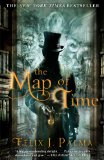Summary | Excerpt | Reviews | Beyond the Book | Readalikes | Genres & Themes | Author Bio

A Novel
by Felix J. Palma
Andrew gazed at the moon for several minutes wondering whether man would ever be able to travel there, as had the characters in Jules Verne and Cyrano de Bergerac's works. And what would he find if he did manage to land on its shimmering surface - whether in an airship or shot out of a cannon or with a dozen bottles of dew strapped to his body in the hope that when it evaporated he would float up to the sky like the Gascon swashbuckler's hero? Ariosto the poet had turned the planet into a warehouse where lunatics' reason was stored in vials, but Andrew was more drawn to Plutarch's idea of it as the place where noble souls went after they left the world of the living. Like Plutarch, Andrew preferred to imagine that the moon was where dead people dwelled. He liked to picture them living at peace in ivory palaces built by an army of worker angels or in caves dug out of that white rock, waiting for the living to meet death and to carry on their lives there with them, exactly where they had left off. Sometimes, he imagined that Marie was living at that very moment in one of those grottos, oblivious to what had happened to her and grateful that death had offered her a better existence than life. Marie, pale in all that white splendor, waiting patiently for him to decide once and for all to blow his brains out and come to fill the empty space in her bed.
He stopped gazing at the moon when he noticed that Harold, the coachman, had followed his orders and was standing at the foot of the stairs with a carriage at the ready. As soon as he saw his young master descending the flight of steps, the coachman rushed to open the carriage door. Andrew had always been amused by Harold's display of energy, considering it incongruous in a man approaching sixty, but the coachman clearly kept in good shape.
"Miller's Court," the youth commanded.
Harold was astonished at his request.
"But sir, that's where - "
"Is there some problem, Harold?" Andrew interrupted.
The coachman stared at him for a moment, his mouth hanging ludicrously half-open, before adding:
"None whatsoever, sir."
Andrew gave a nod, signaling that the conversation was at an end. He climbed into the brougham and sat down on the red velvet seat. Glimpsing his reflection in the carriage window, Andrew gave a sigh of despair. Was that haggard countenance really his? It was the face of someone whose life has been seeping out of him unawares, like a pillow losing its stuffing through an open seam. In a certain sense, this was true. Although his face retained the harmonious good looks he was fortunate enough to have been born with, it now resembled an empty shell, a vague impression left in a mound of ashes. The sorrow that had cast a shadow over his soul had taken its toll on his appearance, too, for he could scarcely recognize himself in this aging youth with hollowed cheeks, downcast eyes, and an unkempt beard who stared back at him in the glass. Grief had stunted him, transforming him into a dried-up, sullen creature. Fortunately, the cab began to rock as Harold, having overcome his astonishment, clambered up to his perch. This took Andrew's attention away from the blurred face sketched onto the canvas of the night. The final act of the disastrous performance that had been his life was about to begin, and he was determined to savor every moment of it. He heard the whip crack above his head and, caressing the steely bulge in his pocket, he let himself be lulled by the carriage's gentle sway.
THE CARRIAGE LEFT THE mansion and drove down Carriage Drive, which bordered the lush vegetation of Hyde Park. Gazing through the window at the city, Andrew thought that in less than half an hour's time they would be in the East End. This ride had always fascinated and puzzled him in equal measure, because it allowed him to glimpse in a single sweep every aspect of his beloved London, the world's greatest metropolis, the giant head of an insatiable octopus whose tentacles stretched over almost a fifth of the world's surface, holding Canada, India, Australia, and a large part of Africa in its viselike grip. As the handsome carriage sped east, the salubrious, almost countrified atmosphere of Kensington soon gave way to the crowded urban environment of Piccadilly, and beyond to the Circus where Anteros, the avenger of unrequited love, protrudes like an arrow fired at the city's heart. Beyond Fleet Street, the middle-class dwellings seemingly huddled around St. Paul's Cathedral gradually came into view. Finally, once they had passed the Bank of England and Cornhill Street, a wave of poverty swept over everything, a poverty that people from the adjoining West End knew of only from the satirical cartoons in Punch, and which seemed to pollute the air, making it foul to breathe as it mingled with the stench rising from the Thames.
Excerpted from The Map of Time by Felix J Palma. Copyright © 2011 by Felix J Palma. Excerpted by permission of Atria Books. All rights reserved. No part of this excerpt may be reproduced or reprinted without permission in writing from the publisher.






Believe those who are seeking the truth. Doubt those who find it.
Click Here to find out who said this, as well as discovering other famous literary quotes!
Your guide toexceptional books
BookBrowse seeks out and recommends the best in contemporary fiction and nonfiction—books that not only engage and entertain but also deepen our understanding of ourselves and the world around us.